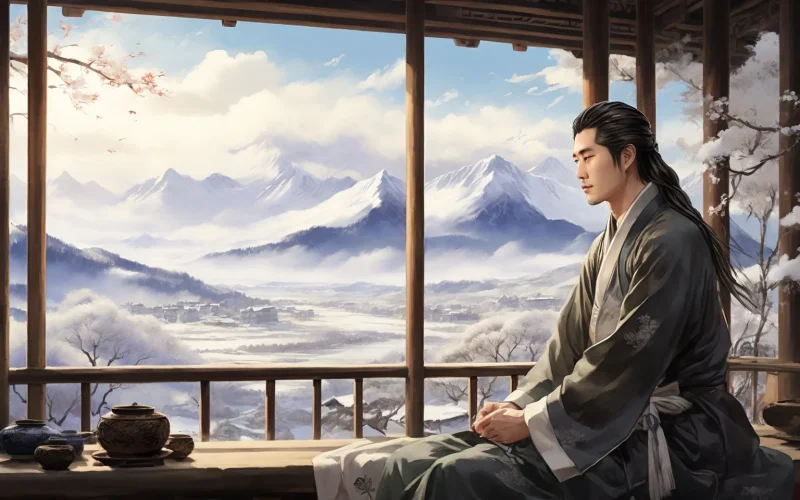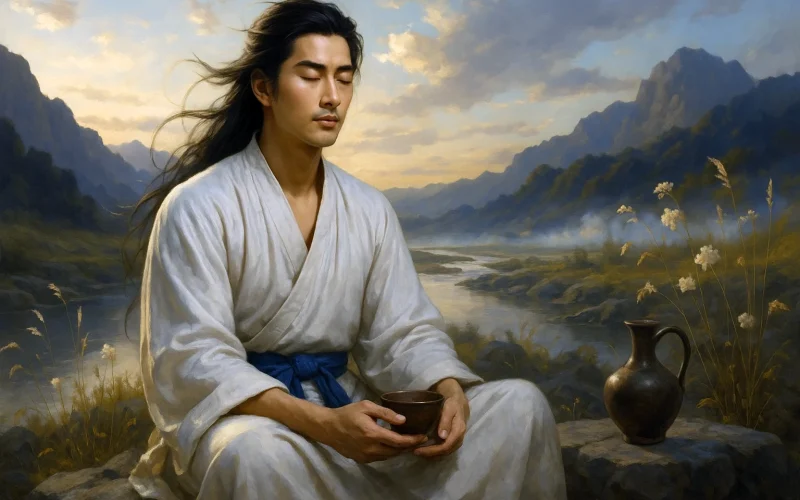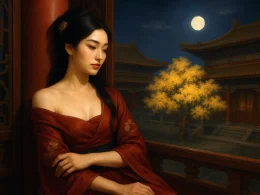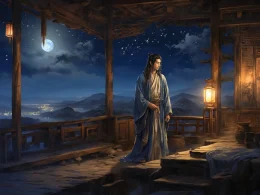How long have I not visited here?
Days have piled up into a year.
Dawn to dusk I see hills and streams,
Scenes are revived as in old dreams.
In fine rain steeped the branches high,
Wind-borne birds ripple cloudy sky.
That’s what a familiar eye sees,
Not saddened by a heartfelt breeze.
Why should I plod along the way,
Tied down to my post all the day?
My body seems bound up in view,
But I’ve a heart none could subdue.
I miss my rural life and song.
Could I be kept away for long?
In homing boat I’d be carefree,
Oh, as a frost-proof cypress tree.
Original Poem
「乙巳岁三月为建威参军使都经钱溪」
陶渊明
我不践斯境,岁月好已积。
晨夕看山川,事事悉如昔。
微雨洗高林,清飙矫云翮。
眷彼品物存,义风都未隔。
伊余何为者,勉励从兹役?
一形似有制,素襟不可易。
园田日梦想,安得久离析?
终怀在归舟,谅哉宜霜柏。
Interpretation
Written when Tao Yuanming was 41 years old, this poem captures a moment of profound introspection during his journey to the capital Jiankang (modern Nanjing) as an envoy. Mooring at Qianxi (east of modern Guichi, Anhui), the poet confronts the conflict between his official duties and pastoral longings, ultimately affirming his unwavering commitment to reclusion. The work stands as a psychological portrait of a soul torn between worldly obligations and spiritual authenticity.
First Stanza: "我不践斯境,岁月好已积。晨夕看山川,事事悉如昔。"
Wǒ bù jiàn sī jìng, suìyuè hǎo yǐ jī. Chénxī kàn shānchuān, shìshì xī rúxī.
These lands my feet had left untrodden - How the years have piled unnoticed. Dawn to dusk I watch mountains and streams - Each detail unchanged as yesterday.
The opening conveys temporal dislocation through subtle contrast between accumulated years ("piled") and unchanging landscapes ("unchanged"), establishing memory as the poem's central tension.
Second Stanza: "微雨洗高林,清飙矫云翮。眷彼品物存,义风都未隔。"
Wēi yǔ xǐ gāo lín, qīng biāo jiǎo yún hé. Juàn bǐ pǐn wù cún, yì fēng dōu wèi gé.
Fine rain cleanses towering woods; Pure gusts lift cloud-soaring wings. These elemental beings endure - Their righteous spirit still unbroken.
Nature's cleansing and elevation through rain and wind becomes symbolic of spiritual purification, with "righteous spirit" (义风) suggesting cosmic moral order.
Third Stanza: "伊余何为者,勉励从兹役?一形似有制,素襟不可易。"
Yī yú hé wéi zhě, miǎnlì cóng zī yì? Yī xíng sì yǒu zhì, sù jīn bùkě yì.
Why then do I persist in this service? My body may seem constrained, But this unstained heart cannot be altered.
The rhetorical question acknowledges worldly compromise while asserting inner constancy, with "unstained heart" (素襟) embodying Tao's ethical core.
Fourth Stanza: "园田日梦想,安得久离析?终怀在归舟,谅哉宜霜柏。"
Yuán tián rì mèngxiǎng, ān dé jiǔ líxī? Zhōng huái zài guī zhōu, liàng zāi yí shuāng bǎi.
Daily I dream of garden fields - How can this separation last? My return boat waits in the heart's harbor - Firm as frost-hardened cypress!
The conclusion transforms "return boat" into a metaphor for inevitable homecoming, while the "frost-hardened cypress" symbolizes resilience against life's hardships.
Holistic Appreciation
The poem constructs a fourfold meditation on time, nature, duty and return. From initial astonishment at landscape's permanence, through nature's cleansing power, to self-questioning about official service, and finally to dreams of pastoral return, Tao charts an emotional journey from dislocation to resolution. The Qianxi landscape becomes both mirror and catalyst - its unchanging quality highlighting life's transient compromises, while its purity reinforces his ethical convictions.
Writing Characteristics
- Layered Temporality: Juxtaposes geological permanence with human transience
- Natural Symbolism: Elements (rain, wind, cypress) embody spiritual states
- Structural Progression: Four stanzas form complete psychological arc
- Ethical Vividness: "Unstained heart" and "frost-hardened cypress" make virtues tangible
Insights
This riverbank meditation reveals how physical journeys can become spiritual crossroads. Tao demonstrates that true integrity isn't never compromising, but knowing which inner lines never to cross. His "unstained heart" suggests our core self can remain inviolate even when circumstances demand surface adaptations. The poem ultimately affirms that homecoming begins in the mind before manifesting in life - the "return boat" first exists in the heart's harbor before docking in reality. This timeless wisdom speaks to all who navigate between practical necessities and authentic callings.
Poem translator
Xu Yuanchong (许渊冲)
About the poet

Tao Yuanming(陶渊明), 365 – 427 CE, was a poet, literary figure, fu writer, and essayist active during the late Eastern Jin and early Liu Song dynasties. Born in Chaisang (near present-day Jiujiang, Jiangxi Province), he pioneered a new genre of pastoral-themed literature, expressing profound philosophical insights through simple language. His poetic style became an enduring aesthetic standard in classical Chinese poetry.












